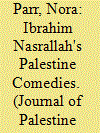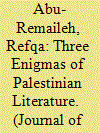| Srl | Item |
| 1 |
ID:
166899


|
|
|
|
|
| Summary/Abstract |
Conceptually linked, noncontiguous, and undeniably national, Ibrahim Nasrallah's book series Al-milhat al-filastiniyya (The Palestine Comedies) breaks conceptual ground. Told across twelve volumes, the Comedies represents the long-called for Palestinian national novel, though in unconventional form. The series uses diverse literary devices, including intertextuality and the archetype of the twin, to demonstrate how formal innovations can redirect assumptions about what constitutes not only a national novel, but also a nation. The series reimagines relationships between space, time, and people, giving narrative shape to a community so often imagined as fragments. Abandoning the retrospective prerequisite of bounded sovereign space and homogeneous, linear time, the Comedies imagines a “nation constellation.” A close examination of two novels within the series, A'ras amna (2004) and Tifl al-mimhat (2000), shows how Palestinian relationships can be imagined outside existing national logics. It reads the constellation as an alternative nation form that can both encompass colonial frameworks and free the delimitation of Palestine from the dominance of power structures that only begin with the nation-state.
|
|
|
|
|
|
|
|
|
|
|
|
|
|
|
|
| 2 |
ID:
166897


|
|
|
|
|
| Summary/Abstract |
As an introduction to the Journal's literary feature, this contribution aims to shed light on recent scholarship on Palestinian literature with a view to integrating discussions of literature more concretely within the broader field of Palestine studies. The contribution structures the discussion of the articles by Amal Eqeiq and Nora Parr around three enigmas that preoccupy scholars of Palestinian literature: writing a national literature without a nation-state, writing silence and nonlinearity, and writing fragmentation and wholeness. It highlights that challenges for scholarship on Palestinian literature revolve around rethinking conventional categorizations, canonizations, and periodizations to better understand how a national literature emerged in a context of exile, fragmentation, and statelessness, and how processes of cultural production operate in extranational conditions.
|
|
|
|
|
|
|
|
|
|
|
|
|
|
|
|